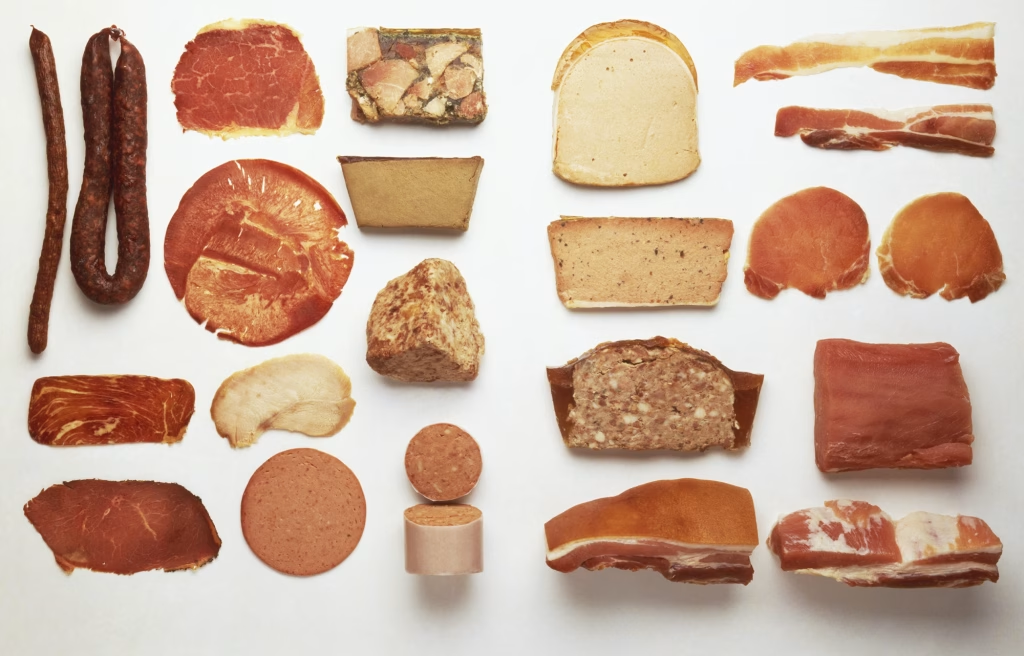In today’s fast-paced world, convenience often takes priority over nutrition. From breakfast bars to soft drinks, we consume a variety of foods daily that our bodies were never designed to process efficiently. These items may be popular, affordable, or even addictive, but many of them are far from natural for the human body.
While occasional indulgence is harmless for most people, making certain foods part of your daily diet can lead to chronic health issues, digestive problems, or even long-term disease risks. Let’s explore some common foods that humans are not biologically designed to consume daily, even though our modern lifestyles have normalized their consumption.
1. Processed Meats
Examples: Bacon, sausage, hot dogs, deli meats
Processed meats are everywhere — in our sandwiches, breakfast plates, and fast food. However, humans are not designed to consume these chemically altered meats regularly. They’re often preserved with nitrates and nitrites, which, when exposed to high heat, can form carcinogenic compounds.
The World Health Organization (WHO) has classified processed meat as a Group 1 carcinogen, linking it directly to colorectal cancer. Our digestive system struggles with the chemical additives and excessive sodium in these products.
2. Refined Sugar
Examples: Soda, candy, pastries, sugary cereals
Refined sugar is one of the most overconsumed and biologically unnatural substances in the modern diet. Unlike natural sugars found in fruits, refined sugar is heavily processed and lacks fiber, vitamins, or minerals. When consumed, it causes a spike in insulin levels, leading to energy crashes, weight gain, and eventually insulin resistance or type 2 diabetes.
Early humans had limited access to sugar, and our bodies still struggle with its high intake, especially in processed, liquid forms such as soft drinks.
3. Artificial Sweeteners
Examples: Aspartame, sucralose, saccharin (found in diet sodas and sugar-free snacks)
While they contain little or no calories, artificial sweeteners confuse the body’s metabolic processes. Some studies suggest that these sweeteners can alter gut bacteria, affect insulin response, and increase sugar cravings rather than reduce them.
Our ancestors evolved consuming natural sugars in fruits and honey, not synthetic molecules created in labs. Regular use of artificial sweeteners may disrupt hunger hormones and contribute to overeating.
4. Vegetable Oils (Highly Refined)
Examples: Corn oil, soybean oil, sunflower oil, canola oil
Modern vegetable oils undergo heavy industrial processing, including chemical extraction and high-heat refining. These oils are rich in omega-6 fatty acids, which, when consumed in excess, lead to chronic inflammation — a root cause of heart disease, obesity, and autoimmune disorders.
Before the advent of industrial agriculture, humans primarily consumed natural fats, such as olive oil, coconut oil, or animal fat, in moderation. The shift to highly processed vegetable oils is a relatively recent phenomenon, and our bodies haven’t yet fully adapted to it.
5. White Bread and Refined Grains
Examples: White bread, pasta, white rice, pastries
Refined grains are stripped of their fiber, vitamins, and minerals during processing. What remains is a simple carbohydrate that rapidly converts into glucose, causing blood sugar spikes.
Humans evolved eating whole grains, seeds, and fibrous roots. Modern white bread, for example, has little resemblance to ancient grains. Regular consumption can lead to weight gain, diabetes, and cardiovascular issues.
6. Fast Food
Examples: Burgers, fries, nuggets, milkshakes
Fast food is the poster child for ultra-processed diets. It’s loaded with refined sugars, trans fats, sodium, and artificial flavorings. These foods are designed to be hyper-palatable, often leading to overeating and addiction-like responses in the brain.
Our ancestors hunted, gathered, and cooked their meals from whole foods. Today’s deep-fried, mass-produced items are not only unnatural — they’re built for profit, not health.
7. Energy Drinks
Examples: Red Bull, Monster, Rockstar
Energy drinks are marketed as performance enhancers but are essentially caffeine bombs loaded with sugar, artificial colors, and stimulants. They place intense stress on the cardiovascular and nervous systems, increasing risks of anxiety, high blood pressure, and heart rhythm disturbances.
Humans are not evolutionarily adapted to consuming 500mg of caffeine and stimulants in one sitting. Nature’s energy boost was sunlight, movement, and maybe a handful of berries — not liquid adrenaline.
8. Flavored Yogurts
Examples: Fruit-on-the-bottom yogurt, kid-friendly tubes, dessert-style yogurts
While yogurt can be a healthy option, most store-bought flavored varieties are closer to desserts than to health food. Packed with added sugars, syrups, and thickeners, they erase the probiotic and protein benefits that yogurt is supposed to offer.
Ancient humans likely consumed fermented dairy in small amounts, without the candy-level sugar content of modern brands. If it tastes like ice cream, it probably doesn’t belong in your breakfast routine.
9. Margarine and “Fake” Butters
Examples: Hydrogenated spreads and butter substitutes
In the mid-20th century, margarine was marketed as a “heart-healthy” alternative to butter. However, many of these spreads were made with trans fats, which are now linked to increased risk of heart disease, stroke, and inflammation.
Humans are not biologically equipped to process artificial fats made through hydrogenation. Natural fats, when consumed in balance, are a far better option.
10. Breakfast Cereals
Examples: Frosted Flakes, Froot Loops, Cocoa Puffs
Often advertised as part of a “balanced breakfast,” most breakfast cereals are heavily refined, sugar-laden products that offer little real nutrition. They spike blood sugar, promote overeating, and crash your energy before lunch.
Humans didn’t evolve eating cereal out of a box. A bowl of seeds, fruits, and nuts would be closer to what our ancestors enjoyed — and far healthier.
Why Are We Eating Foods We’re Not Designed For?
The answer is simple: marketing, convenience, affordability, and lack of awareness. The modern food industry is primarily driven by profit, rather than health. Ultra-processed foods are inexpensive to produce, highly addictive to consume, and easy to market. Over time, we’ve normalized these products as “everyday staples.”
However, the human body is still primarily Stone Age in its biology, optimized for natural, whole foods rather than synthetic chemicals, sugar, and preservatives.
What Can You Eat Instead?
You don’t need to live like a caveman, but real food should dominate your diet:
Fresh vegetables and fruits
Whole grains like quinoa, oats, and brown rice
Nuts, seeds, and legumes
Lean proteins — fish, poultry, eggs
Healthy fats like olive oil, avocado, and ghee
Fermented foods like kefir, sauerkraut, and plain yogurt
These foods nourish your body the way nature intended — without side effects or hidden ingredients.
Final Thoughts
Modern diets are packed with everyday foods our bodies aren’t designed to eat — and the health consequences are catching up to us. From rising obesity to autoimmune disease and metabolic disorders, the evidence is clear: what we eat matters.
It’s time to take a critical look at what’s on our plates. Awareness is the first step toward change. Swap convenience for consciousness, and your body will thank you — not just today, but for decades to come.



